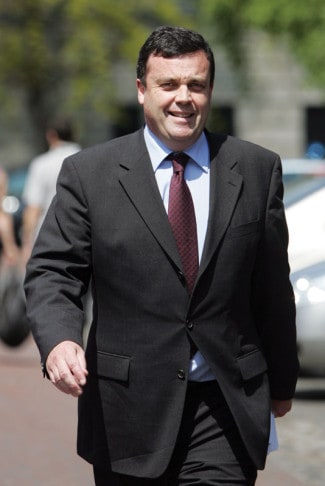The Minister for Expenditure and Reform has been outspoken on the need to transform the public sector following the progress report on the Croke Park agreement released this month.
Because
The Minister for Expenditure and Reform has been outspoken on the need to transform the public sector following the progress report on the Croke Park agreement released this month.
Howlin has tackled the issue of expenditure in the public sector, job cuts that will need to be taken and the uneven pay scales in different departments.
Croke Park
The first review of the Croke Park agreement was released this month, and it found that there had been savings of €289 million in the public service pay bill, mainly due to a reduction of more than 5,300 in staff numbers. The report also found that non-pay measures had saved around €308 million.
Despite the progress in savings, Howlin said that more measures would be needed to get the public sector on a sustainable path, “in view of the severe fiscal constraints we face, the reality is that further significant cuts in expenditure, coupled with further substantial reductions in the numbers employed in the public service are unavoidable”.
Pay reforms
Howlin has called for transparency in public sector salaries, and has also called on the top CEOs of semi-State bodies to take a voluntary cut and to “examine their own conscience to ensure that everybody shares in this burden”.
“In light of the ongoing severe economic conditions facing the country, there is a need for leadership to be shown by those who hold high office across the public sector,” he said.
Howlin made the appeal as he announced salary caps for newly recruited senior civil servants, judges and semi-State chief executives. He also announced a general salary cap of €250,000 for the bosses of 28 other semi-State bodies in the future.
The exception will be the ESB where the chief executive will be paid around €319,000. Under the new rules, senior civil servants will be paid a maximum of €200,000.
Firm stance
In his role as Minister for Public Expenditure and Reform, Howlin has been keen to stress the precarious position of the public finances, and how important the changes he wants to implement are: “We want to preserve the social solidarity that has been manifest in this process to date and not to have the discordant situation that you have in Greece, where people resist change that I’m afraid is inevitable.”
“Rubber-stamping of performance-related pay has to stop,” Howlin was reported as saying, “the performance-related pay was considered by government, and contractually they are part of many people’s legal situation that can’t be immediately disturbed. But I’ve been asked to look at that because, in the past, some performance-related pay was taken as a rubber stamp by the board as an intrinsic part of pay.”
Labour force
Howlin was one of the three negotiators for the Labour Party in the coalition talks following the general election, and is a former deputy leader of the party.
Howlin represents Wexford in the Dáil. He was first elected to the Dáil in 1987 and was appointed as party spokesman on constitutional matters and law reform in 2007.
A former Health and Environment minister, Howlin was elected Leas-Cheann Comhairle of the Dáil in June 2007.
CV highlights
- Appointed Minister for Public Expenditure & Reform March 2011.
- Elected as Leas-Cheann Comhairle of Dáil Éireann on 26th June 2007.
 Business & Finance, Business Person of the Month
Business & Finance, Business Person of the Month
Business & Finance, in association with MERC Partners, has been awarding excellence in business through the ‘Business Person of the Month’ award over the last number of years. These awards seek to recognise noteworthy achievements in business leadership, and particularly those that make a telling contribution to the wider business community in Ireland.





